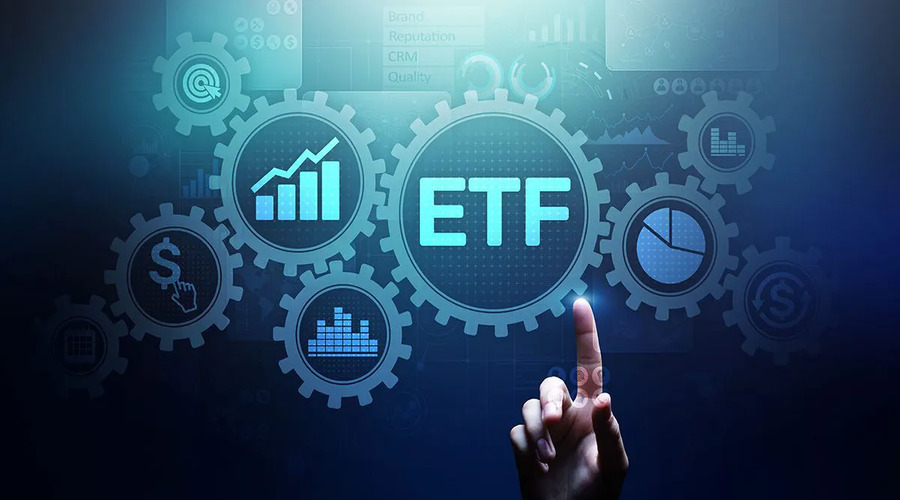

Decentralized finance (DeFi) ETFs are investment products that allow investors to gain exposure to a diversified portfolio of DeFi tokens. DeFi ETFs have gained significant popularity in recent years, as more investors seek to invest in the growing DeFi ecosystem. This article aims to provide a comprehensive guide to DeFi ETFs for beginners, covering everything from their basics to their benefits and risks.
What are DeFi ETFs?
DeFi ETFs are exchange-traded funds that invest in a diversified portfolio of DeFi tokens. ETFs are investment products that allow investors to gain exposure to a basket of assets through a single investment. DeFi ETFs enable investors to invest in a diversified portfolio of DeFi tokens without the need to purchase and manage each token individually.
How Do DeFi ETFs Work?
DeFi ETFs work by using a basket of DeFi tokens that are selected and managed by the ETF provider. The ETF provider purchases and holds the underlying DeFi tokens in the ETF, and investors can buy and sell shares of the ETF on an exchange. The value of the ETF is based on the performance of the underlying DeFi tokens.
Benefits of DeFi ETFs
DeFi ETFs offer several benefits to investors, including:
Diversification
DeFi ETFs offer investors a diversified portfolio of DeFi tokens, which can reduce the risk of investing in a single token. Diversification can also provide more stable returns over time.
Accessibility
DeFi ETFs are available to all investors who have access to an exchange that trades them. This makes it easier for investors to invest in DeFi without the need to purchase and manage each token individually.
Liquidity
DeFi ETFs are highly liquid, meaning that investors can buy and sell shares of the ETF on an exchange at any time during market hours.
Low Fees
DeFi ETFs typically have lower fees than actively managed investment products, such as mutual funds. This can result in higher net returns for investors over time.
Professional Management
DeFi ETFs are managed by professional portfolio managers who have expertise in managing investment portfolios. This can provide investors with more confidence in the management of their investments.
Risks of DeFi ETFs
Despite their benefits, DeFi ETFs also have some risks that investors should be aware of, including:
Volatility
DeFi tokens are highly volatile and can experience significant price fluctuations. This can lead to significant gains or losses for the ETF and its investors.
Smart Contract Risk
DeFi ETFs rely on smart contracts to execute transactions, which can be subject to bugs and hacks. This can result in significant financial losses for the ETF and its investors.
Regulatory Risk
DeFi is largely unregulated, which means that there is a risk of regulatory crackdowns or legal challenges in the future.
DeFi ETF Providers
There are several DeFi ETF providers available that offer different investment products, including:
DeFi Pulse Index
The DeFi Pulse Index is an index fund that tracks the performance of a basket of DeFi tokens, including Uniswap, Aave, Compound, and other top DeFi tokens.
Bitwise DeFi Crypto Index Fund
The Bitwise DeFi Crypto Index Fund is an ETF that invests in a diversified portfolio of DeFi tokens, including Bitcoin and Ethereum.
Grayscale DeFi Fund
The Grayscale DeFi Fund is a trust that invests in a diversified portfolio of DeFi tokens, including Uniswap, Aave, Compound, and other top DeFi tokens.
How to Invest in DeFi ETFs
Investing in DeFi ETFs is similar to investing in any other ETF. Here are some steps to follow to invest in DeFi ETFs:
Choose a DeFi ETF provider:
Research and compare different DeFi ETF providers based on factors such as investment strategy, fees, and track record.
Open a brokerage account:
To invest in DeFi ETFs, you’ll need to open a brokerage account with a broker that offers access to the ETF.
Fund your brokerage account:
Once you have a brokerage account, you’ll need to fund it with cash or cryptocurrency.
Buy shares of the DeFi ETF:
Once your brokerage account is funded, you can buy shares of the DeFi ETF on an exchange.
Monitor your investment:
Keep track of the performance of your DeFi ETF investment and make adjustments as needed.
DeFi ETFs vs. Individual DeFi Tokens
Investing in DeFi ETFs offers several advantages over investing in individual DeFi tokens, including:
Diversification
DeFi ETFs offer investors a diversified portfolio of DeFi tokens, which can reduce the risk of investing in a single token.
Professional Management
DeFi ETFs are managed by professional portfolio managers who have expertise in managing investment portfolios. This can provide investors with more confidence in the management of their investments.
Accessibility
DeFi ETFs are available to all investors who have access to an exchange that trades them. This makes it easier for investors to invest in DeFi without the need to purchase and manage each token individually.
Lower Fees
DeFi ETFs typically have lower fees than actively managed investment products, such as mutual funds. This can result in higher net returns for investors over time.
DeFi ETFs Use Cases
DeFi ETFs have several use cases, including:
Passive Investment
DeFi ETFs offer a passive investment strategy for those who are bullish on the DeFi market but don’t have the time or expertise to manage a portfolio of individual DeFi tokens.
Diversification
DeFi ETFs offer investors a diversified portfolio of DeFi tokens, which can reduce the risk of investing in a single token.
Long-term Investing
DeFi ETFs can be a good investment option for those who believe in the long-term potential of the DeFi ecosystem.
Conclusion
DeFi ETFs are investment products that offer investors exposure to a diversified portfolio of DeFi tokens. They offer several advantages over investing in individual DeFi tokens, including diversification, professional management, accessibility, and lower fees. However, they also have some risks, including volatility, smart contract risk, and regulatory risk. As the DeFi ecosystem continues to evolve, DeFi ETFs will likely face new challenges and opportunities, but their potential to transform the investment landscape is immense.


I have been writing about crypto for over two years. I have a vast amount of experience in the industry and my work has been featured on some of the biggest publications in the space.
